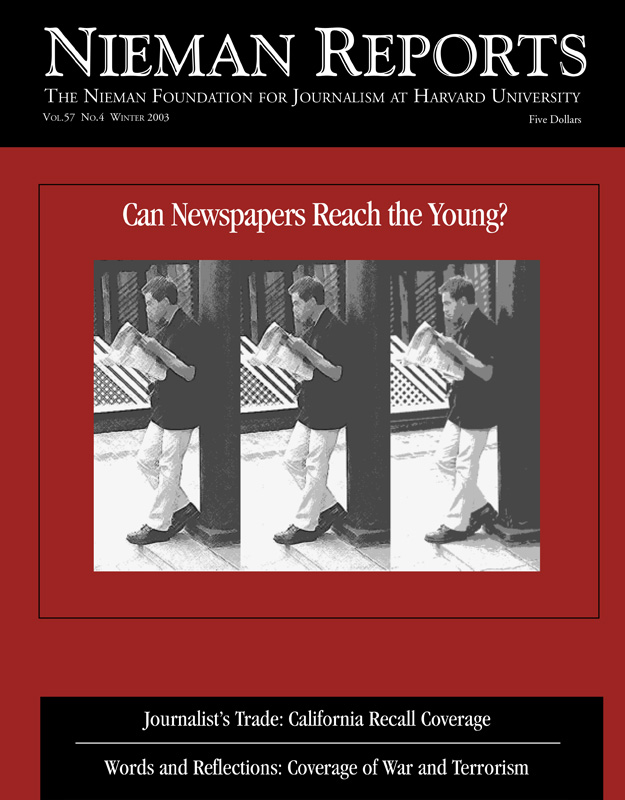NiemanWatchdog.org is about to get started. I’m the editor, and I can use your help.
As you might know, the Nieman Foundation has had its Watchdog Journalism Project for six years, created and funded by Murrey Marder, a distinguished, retired Washington Post diplomatic reporter. Marder’s commitment to watchdog reporting is intense. He believes it’s possible that, if reporters and editors work hard, perhaps they can help to improve things here and there and, once in a while, possibly even avert catastrophes. It’s a belief a lot of us share. And if we believe this, we must continually work to see that it happens. This is what this new Web site is all about.
Watchdog reporting means holding accountable people and groups in positions of power and especially in government. In practice, fidelity to this goal ebbs and flows.
A grievous default in watchfulness by both the press and Congress in 1964 plunged the United States into the Vietnam War on a false rationale. While the principles remain constant, each generation has to learn the watchdog lesson anew. In Iraq, as in the Vietnam conflict, the shortcomings of the press have been remarkably similar: lack of probing pre-war questions about the war’s justification, about the political, economic and military components of the U.S. war-fighting strategy and, most important of all, about the postwar costs and consequences.
Until now, the Nieman Watchdog Project relied primarily on conferences with members of the press—most held at Harvard University, one in Washington, D.C.—to stimulate greater interest in how to use reporting to hold the powerful accountable. But the advent of the war on terrorism, with its wars in Afghanistan and Iraq, have made it imperative to reach a wider audience more quickly. The Internet makes this possible. During earlier times of war the public was conditioned to criticize the press for disclosing too much, but in the Iraq conflict a considerable portion of the public has been criticizing journalists for failing to question government policymakers vigorously enough.
With the Internet revolution, anyone connected to the Web has access to more raw information and far more opinion than any journalist could possibly sort through. What this means is that there is a critical need in this always churning news world for knowledge and ability to evaluate this deluge of data. No reporter or editor is equipped to cope with the interwoven complexities of foreign and domestic policy, science, economics, the environment, world trade, culture, religion, genetics and all the other issues that now engulf us.
NiemanWatchdog.org is poised to assume this role in offering a unique service to journalists at newspapers, TV and radio and to online reporters and editors, journalism students, and citizens who care about the world around them.
The Nieman Foundation’s objective is to “elevate the standards of journalism” by further educating “persons deemed especially qualified for journalism.” The Watchdog Web site will marshal the vast learning resources of Harvard University, which have nourished Nieman Fellows for more than a half-century, to help supply inspiration for questions and lines of inquiry that reporters around the globe can pursue with policymakers. Harvard University will not be the sole source of information on this site; thought-provoking ideas will be offered by other academic centers, scientists and specialists from these diverse fields.
We want to cajole, encourage, prod, stroke and, in the end, help create a sense of urgency and obligation to higher reporting standards. We will be international in scope. We will offer less trivia and more substance, but we also know that if we are dull, or even hard to navigate, we are dead.
We have plans for several main features, each of which focuses on interactivity. In one part of the site, there will be brief essays or columns by Harvard professors and other experts in a variety of fields. The journalist can select the subject matter to explore, such as how to better report on OPEC or race relations or recidivism or Afghanistan. This list is large. These experts might focus their writing on aspects of an issue that the press isn’t covering well and might include questions that ought to be asked. And here is where the interactivity begins: The essays, commentary and questions will be open for comment and queries by the user.
Our site will debut during the upcoming election campaign, which means we will present a lot of material about politics in America. For example, a Harvard Kennedy School of Government professor contends that misguided election campaign coverage is partly to blame for low voter turnout in the United States. He’ll present his views and suggestions for better reporting, and then journalists, if they desire, can query him before using his information to inform their reporting.
We are asking for as much assistance as possible from alumni/ae and readers of Nieman Reports. Consider this Web project a family business. It won’t take long to see what we’re about and, when you visit us, we’d appreciate hearing back from you with your questions and comments and also with your ideas for issues we should tackle. Please also let friends and colleagues know what we’re doing. This is your project, too.
Barry Sussman was a Washington Post editor for 22 years. He was special Watergate editor, a columnist for the Post’s National Weekly edition, and director of opinion polls. He left the Post in 1987 and in recent years has been a news media consultant as well as the author of several books.


